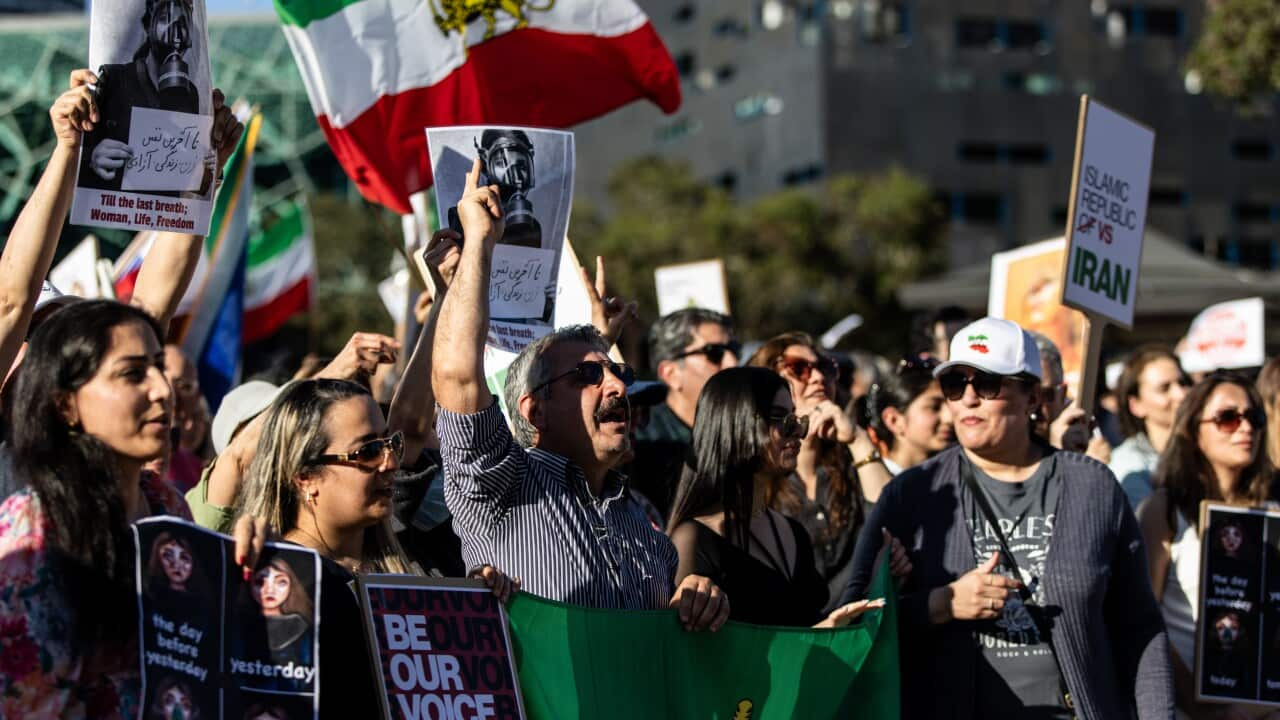Maral Esfand is playing the piano, practising an age-old Persian romance song with her bandmate in her apartment.
While her hands are tapping the keys in Sydney, her heart drifts back to her home country of Iran.
"I think everything and everyone in Iran or every Persian person out of Iran is affected by what's going on in Iran, and no one can stay away from that. And so are we," she tells SBS News.
It's been a year since a wave of protests swept through Iran as women demanded more freedom from the country's strict laws.
The unrest was triggered by after being arrested by Iran's so-called morality police, for allegedly not wearing her hijab properly.
Maral has been playing the piano for as long as she can remember, and played the violin when she was 10-years-old.
But she left Iran at the age of 17, realising a musical career would be difficult if she stayed.
"I was part of two orchestras at that time. Let me tell you, we never got to perform. We used to practise a lot, we used to rehearse a lot, but it was so hard to actually perform," she says.

Maral has been playing the piano since she was a child. Credit: Supplied
Ban on music in Iran
Following the 1979 Iranian Revolution, the country's former leader Ayatollah Ruhollah Khomeini immediately banned popular music, likening it to opium.
In 2000 a total music ban was lifted, but restrictions still remained over music that had lyrics the government deemed to be "corrupt".
"It is not okay to show an instrument on TV [in Iran] and I'm not even talking about women singing because that's totally out of frame."
Emeritus Professor Amin Saikal, a Middle East specialist at the Australian National University, says the Iranian Revolutionary Guard Corps places laws that are linked to how they interpret Islam, used strategically to crack down on civilians.
"Iranian state ideology dictates that any form of performance which goes against their version or interpretation of Islam is regarded as unlawful," he says.
"Religion and politics are really mixed in Iran and they've been applied interactively in order to legitimatise the position of the clerical rule."
That pent-up anger has emboldened others to continue protesting, raising their voices to the beat of their music.

Maral sees her all-female band as a natural aftermath of women's liberation. Credit: Supplied
Professor Saikal says they face serious punishment if they're caught singing by the country's police — in fact, any form of law contravention can be dangerous for people in Iran.
"Anything that works against the ideology of the state, that is punishable. Of course, in the last year or so there have been demonstrations in Iran, particularly on the part of women," he says.
"Many people have been arrested and some of them have been convicted and some of them have been hanged for crimes on earth or crimes against God."
Amnesty International says that since the protests broke out, tens of thousands of people have been arrested and seven men executed. Their crimes ranged from property damage to the deaths of security forces during the unrest.
Lifting the 'Voices of Women'
Maral moved to Australia in 2022 and now leads an all-female band. It's fittingly aimed at empowering women to enter the professional music industry.
While the band was formed in the wake of the Woman Life Freedom movement, Maral says it wasn't a direct result of the protests - but a seemingly natural aftermath of women's liberation.
Its establishment "has not been in exact relation to the Mahsa Amini protests, but it's a result of the fights that women have been doing all through the years," she says.
"Having a stage dedicated to only women comes parallel with what's going on in Iran. The goal to be heard, the goal to be seen."

Maral's six-year-old student Tara Taghavi. Credit: Supplied
That song has become the anthem of the worldwide movement. Together, wearing colourful Iranian vests as their band uniform, they sang the lyrics: "Either all together or all alone ... the chain of universal oppression breaks with our hands."
Beyond playing with her band, Maral keeps busy by teaching piano to 60 girls a week, many of them hailing from Iran.
The next generation taking the lead is music to her ears.











